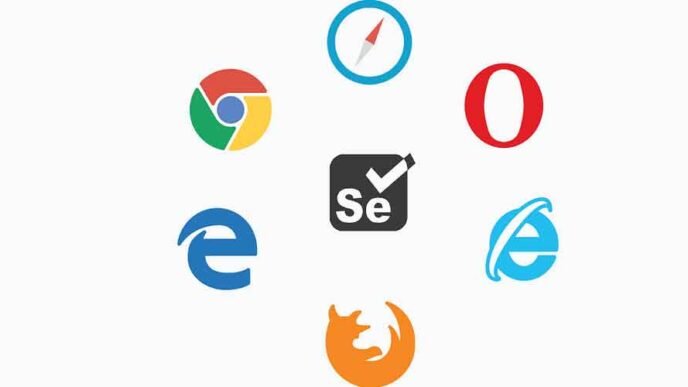The market for mobile apps is increasing, with millions of apps available to be downloaded across various platforms. The assurance that these apps will work excellently on different devices is important for users’ satisfaction and success in the market. This has increased the importance of mobile app testing, making it an important component of the software development life cycle. Mobile app testing involves testing for iOS and Android applications across different device platforms and device farms consisting of multiple devices.
With the increase of mobile apps, the demand for skilled mobile app testers has also increased in recent years, given that applications must work flawlessly on every possible device a user might use.
This means that professional mobile application testers have become more important than ever in improving mobile applications’ continuous quality and reliability. Therefore, it is essential to possess relevant certifications to vastly improve a tester’s career and equip them with modern mobile app testing knowledge.
This article looks at the best mobile app testing certifications one should take up in 2024.
Why Is Mobile App Certification Important?
In this section, we will discuss some of the reasons why mobile app testing certification is important and how it can transform a tester’s career.
Higher Earning Potential
The most concrete advantages of being certified are increased earnings through a higher salary. Most certified professionals often command higher remuneration as opposed to the non-certified. This mostly happens since certifications are formal recognitions of one’s expertise and dedication to the profession.
Qualifying For Advanced Roles
Certification makes one eligible for advanced and specialized roles, such as Senior Test Automation Engineer, QA Lead, or Test Manager. These roles typically require much higher levels of expertise, which certifications can prove.
Staying Updated With Best Practices
Certification programs are updated regularly to include the industry’s latest standards and best practices. By getting certified, you commit yourself to lifelong learning and professional development to be up-to-date with new tools, techniques, and trends in automated testing.
Professional communities
Many certification programs provide membership in professional organizations or access to exclusive online communities. These platforms offer the opportunity to connect and network with fellow professionals, share knowledge, and discuss industry trends. Such connections can provide referral opportunities, mentorship, and collaborations with colleagues.
Best Mobile App Testing Certifications
So far, we have learned about the importance of mobile app testing certifications. In this section, we will deep dive into some of the most popular mobile app testing certifications to take in 2024.
Appium 101
The Appium 101 Certification by LambdaTest is specially designed for those professionals looking to excel in the ever-competitive domain of Appium testing, thus making it a perfect choice for those who want to upgrade their career trajectory. This certification is designed to make participants capable enough to succeed in mobile app testing using Appium.
At its core, LambdaTest is an AI-based test orchestration and execution platform that allows you to run manual and automation testing at scale over 3000+ environments. LambdaTest also provides various certifications besides Appium to help testers and developers excel in their careers.
Pre-requisites:
- Knowledge of the Appium framework.
- Deep knowledge of the DOM and web locators in Appium.
- Deep knowledge of web or native app testing with the frameworks supported by Appium.
- Experience in running tests, including serial and parallel, on the cloud grid.
Assessment:
The assessment comprises two rounds, each with a 50% weighting towards the final score.
Round 1 – Objective
This round tests your theoretical knowledge of the Appium framework, including its architecture, core concepts, DOM manipulation, web locators, and mobile app testing methodologies.
- Format: Multiple-choice questions (MCQs)
- Duration: 45 minutes
- Number of Questions: 40
- Weightage: 50%
Round 2 – Assignment
Content: This round assesses your practical skills in automating mobile app test scenarios. To become certified, 70% of the cumulative score is required.
- Format: Practical Assignment
- Duration: 36 hours
- Task: Automate a specific test scenario using Appium
- Weightage: 50%
Learning Materials:
Here’s a rundown of what is covered and what you can hope to learn:
- What is Appium?
- How to install Appium?
- How to install Android emulators?
- How to install APK files & Appium Inspector?
- Appium Framework Design
- How to Run Your First Appium Test
- Appium Framework Design: Test Data Management with JSON
- How To Perform Mobile App Testing Using Appium
Certified Tester Mobile Application Testing (CT-MAT)
The ISTQB Mobile Application Testing (CT-MAT) certification provides insight into methods, techniques, and tools a professional may use to test mobile applications. It covers the required mobile project activities, roles, methods, and methodologies.
Entry Requirements:
To take the CT-MAT exam, you must hold the ISTQB Certified Tester Foundation Level certification.
Exam Structure:
- No. of Questions: 40
- Total Points:40
- Passing Score:26
- Exam Length (mins): 60 (+25% Non-Native Language)
Learning Materials:
- Overview of the mobile world and mobile application test types.
- Mobile application testing process, techniques, and tools.
- Automation in mobile testing.
Appium – Mobile Testing with Latest 2.0 and Live Projects
This course by Udemy provides in-depth training on mobile app automation for both iOS and Android using Appium on real devices. It covers 260+ lectures and offers 65+ hours of content with Rahul Arora as an instructor.
Requirements:
- No prior Java/coding knowledge is required, as everything is taught from scratch.
- A basic understanding of WebDriver is required.
Learning Materials:
- Introduction to Appium.
- Installation guide.
- Appium 2.0 overview and installation.
- Running browser tests and native app tests on real devices.
- Corporate training recordings on Selenium basics and Appium mobile automation.
- Gesture handling, Cucumber BDD with page objects, and more.
IMTQN Certified Mobile Application Tester (CMAT)
The International Mobile Testing Qualifications Network is an international mobile application testing qualification certification body. IMTQN Certified Tester is a standardized qualification for mobile software testers and mobile testers. The syllabus-based qualifications have a hierarchy of qualifications and guidelines for accreditation and examination.
In mobile application testing, IMTQN certifications are in high demand. They are the worldwide leader in certifying candidates for mobile application testing, catering to professionals and corporations mainly targeting mobile application testing.
The CMAT certification is the best way to prove your proficiency in mobile application testing and could even open new opportunities in your career path. There is an advanced level of certification, Certified Advanced Mobile Tester (CAMT), by the same institute for those who wish to dig deeper into their mobile testing knowledge and skill set further.
Prerequisite:
This course would be a perfect step in your career if you already hold the ISTQB Certified Tester Foundation Level certificate.
Total course duration: 10-15 hours
Learning Materials:
The following modules are covered under the CMAT certification course:
What is mobile application testing? Testing mobile software intended to be installed on handheld devices.
- Benefits of Testing Mobile Applications: It is important to test mobile applications for functionality, usability, and consistency.
- Types of Mobile Application Testing: Various forms of testing, such as functional, usability, and certification testing.
- Mobile Testing Challenges: Handling issues related to the diversity of devices, network variations, and scripting repeatability.
- Mobile Security and Localization Issues: Confidentiality, integrity, authentication, and other security issues
- Mobile Web vs. Native Apps: Understanding the differences in testing approaches of mobile web and native apps.
Certified Mobile Software Test Professional (CMSTP)
The Mobile Testing Body of Knowledge and the Certified Mobile Software Test Professional have been developed to fill a huge gap in the skills and knowledge required to effectively test and evaluate mobile applications and websites running on mobile devices.
The Mobile Testing Certification Taskforce, a special task force formed with the IIST Advisory Board, recognized the urgent need for a formal education-based mobile testing certification based on a comprehensive body of knowledge to help QA and test professionals meet the challenges of testing mobile devices and applications. The CMSTP is the first education-based mobile testing certification based on the comprehensive Mobile Testing Body of Knowledge.
Who Should Do CMSTP?
- Any person tasked with the responsibility of testing either a mobile application or a website that is running on any mobile device
- Test leads and test managers who want to manage the testing effort for mobile applications.
- Developers want to test mobile apps in a much more effective way.
Pre-requisites:
Before applying for the CMSTP, candidates must meet one of the two following prerequisites:
- Two years of experience in software testing. This shall be demonstrated using a statement signed by the manager or managers the candidate has worked with.
- A basic certification in software testing covers areas 1 and 2 of the Software Test Professionals’ Body of Knowledge as described by the International Institute for Software Testing. Acceptable certifications are IIST CSTP – Associate Level, ISTQB foundation Level CSTE. You can obtain the IIST Certified Software Test Professional – Associate Level either online or at one of our public training events.
Learning Materials:
- Area #1: Mobile Development Technologies
Covers OS (Android, iOS, Windows), hardware (smartphones, tablets), app types (native, web, hybrid), app distribution (App Store, Google Play), and development tech (HTML, JavaScript, Objective-C, Java, Xamarin).
- Area #2: Mobile Testing Strategies and Techniques
Includes testing types (functionality, performance, security), setting up labs (hardware, software, connectivity), and team skills (recruitment, training).
- Area #3: Mobile Compatibility Testing
Focuses on user groups, platform sensitivities (OS, browser, hardware), and risk management.
- Area #4: Automated Mobile Testing
Highlights automation needs, approaches (emulators, modifications), and tool selection.
Conclusion
The rapid growth of the mobile app market and increasing application complexity and device diversity present the critical importance of mobile app testing. For apps to be flawless in performance across multiple platforms, it is of prime importance to user satisfaction and market success. Device farms simulate testing across hundreds of devices, saving time and costs and improving test coverage.
The following are important certifications that can be gained as the demand for skilled mobile app testers continues to soar: LambdaTest Appium 101, ISTQB Mobile Application Testing (CT-MAT), IMTQN Certified Mobile Application Tester (CMAT), and Certified Mobile Software Test Professional (CMSTP). These have significant advantages: they increase potential earnings and qualify professionals for advanced roles, and ensure they are updated with industry best practices and connected with professional communities.
In 2024, getting these certifications will empower you professionally and prove your authority and dedication to excellence in mobile app testing. Whether you’re a tester, test lead, manager, or developer, these certifications will give you the tools and techniques to navigate the evolving landscape of mobile app testing effectively and efficiently. Take the opportunity to advance your career and work for the continuous quality and reliability of mobile applications in the dynamic digital world.












